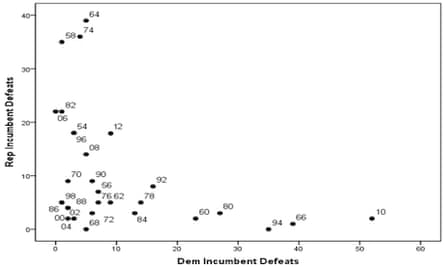There are two biases that I've seen over and over again in the Washington press, and neither is "conservative" or "liberal". One is a bias towards making a big deal out of something that will ultimately have little electoral effect. The other is propping up the idea that Americans are independent, and that the anger directed at both parties right now will lead to an anti-incumbent wave for both Democrats ad Republicans.
I won't say that an anti-incumbent wave is impossible, but I will say that it's not likely. Why?
1. Anti-incumbent waves just don't happen
Take a look at this chart from Alan Abramowitz. It maps out House of Representative incumbent losses in a general election by party since 1954. I've added the 2012 election to the chart.

What you do see is that there are many years in which a large number of incumbents are defeated. What you don't see is the same number of years where incumbents of both parties are defeated. In fact, such years pretty much don't exist.
The only year in which ten or more incumbents of both parties were defeated in the general election was 2012. Seventeen Republicans and ten Democrats went down. That's what you'd expect when there is a lot of redistricting going on around the country. Of the 17 Republicans who made it to the general and didn't win, at least 11 were likely because of redistricting. Of the ten Democrats that bid farewell in the general, at least six were likely because of redistricting.
History can certainly be defied, though there needs to be better proof – especially in a non-redistricting year.
2. The national polling on incumbents isn't that unusual
29% of respondents to a recent NBC/WSJ poll said they thought their representative deserved to be re-elected. That's not significantly different from 1992. The final poll before the 1992 election had the re-elect percentage at 31%, after it actually cratered to 27% during the summer of 1992.
And was there an anti-incumbent wave in 1992? Hardly. In yet another redistricting year, only 24 incumbents lost. Sixteen of those were Democrats and eight were Republicans. Incumbents shouldn't be shaking in their boots given this data.
3. Americans seem to have a fascination with third parties … until they don't
A few weeks ago, Gallup reported that a record high 60% of Americans believed a third party is needed. This week, 30% of NBC/WSJ respondents claimed they'd vote for a third-party candidate for Congress over a Democrat and a Republican. Those percentages seem high, until you realize that this polling looks a lot like it has over the past few years.
58% of Americans said that a third party was needed in the months before the 2010 midterm; 25% said they'd vote for a third party candidate for Congress. Those numbers are not significantly different from today, and the result was not some double party whammy.
Fifty-four Democrats lost re-election in 2010, while only two Republicans did. Those two Republicans were previously elected because of freak circumstances in districts that went for Obama by over 40pt. Not a single independent was elected to the Congress.
4. House district polling doesn't show an anti-incumbent wave
At the end of the day, the House is won and lost in 435 separate districts. What we need for an anti-incumbent wave to occur are named incumbents from both parties with about an equally low approval rating. That's not happening.
Democracy Corps just surveyed a bunch of swing Democratic and Republican districts. They found that while named Democratic incumbents had a -4 net approval rating, named Republicans had a +5 net approval rating. That would suggest Republicans picking up some Democratic seats, but not too many Democrats snagging Republican seats.
Indeed, Republicans are polling better right now than they were in the summer of 2012. Republicans in the first and second tier of vulnerability had a +2 net approval in 2012. This difference in approval rating translates to Republican incumbents being up 7pt in their swing districts now compared to just 2pt in 2012. That would suggest far fewer than the 17 Republican incumbents who went down in 2010. The data would suggest the potential for an anti-Democratic wave (though that doesn't look in the cards at this point); however, if not that many Republican incumbents lose in the general, then it's not really an "anti-incumbent wave".
Overall
There will always be discussion of how voters hate Washington and will "vote all the bums out". It hasn't happened in the past 60 years. The polling numbers at present look a lot like those of prior years when just one or neither party were punished by the voters.
Therefore, there probably isn't going to be an anti-incumbent wave. So, don't believe the hype.
